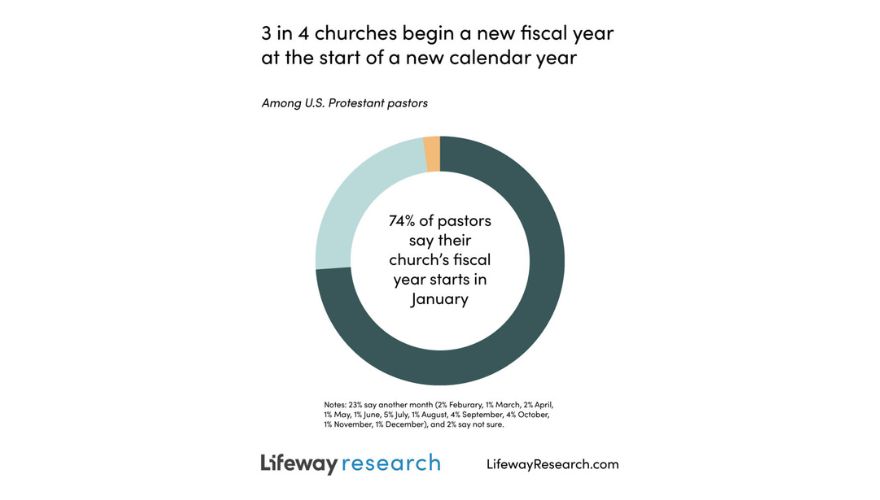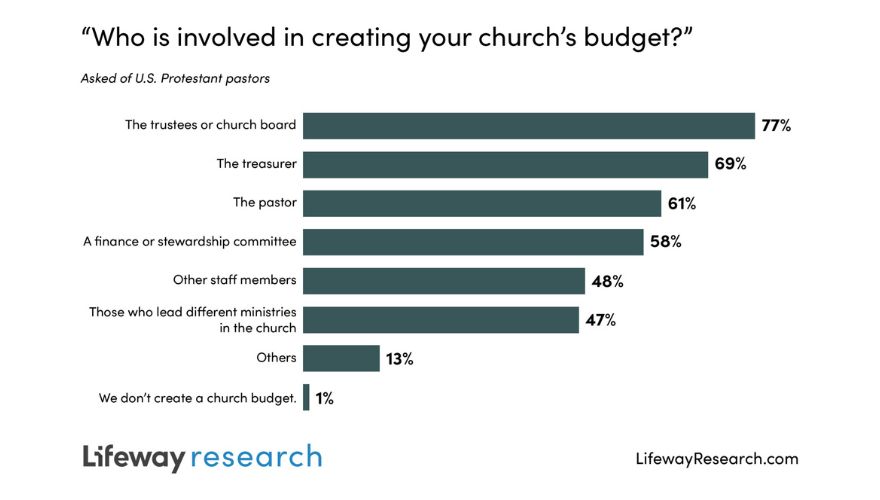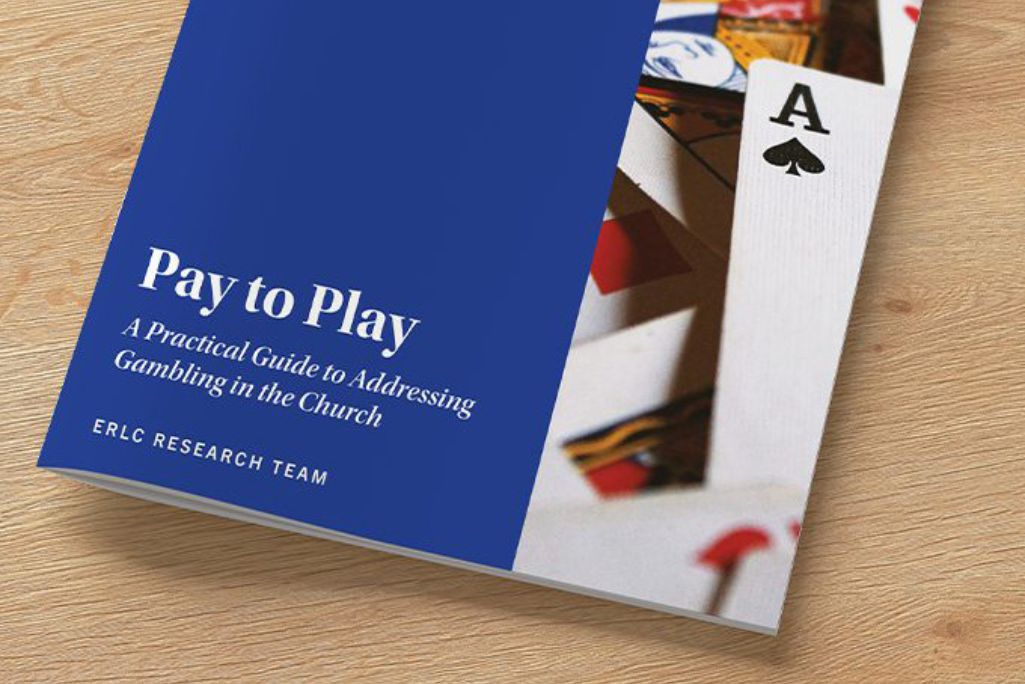
BRENTWOOD, Tenn. (BP) – For most pastors, the start of a new calendar year also indicates the start of a new fiscal year for their churches. But there is much more variety among pastors when it comes to who is involved in making the budget for the fiscal year.
According to a study from Lifeway Research, 74 percent of Protestant pastors say their church’s fiscal year starts in January. One in 20 say their fiscal year starts in July (5 percent), September (4 percent) or October (4 percent). Others say their fiscal year starts in February (2 percent) or April (2 percent). One in 100 say, for their church, it starts in March (1 percent), May (1 percent), June (1 percent), August (1 percent), November (1 percent) or December (1 percent). And 2 percent of pastors aren’t sure when their church’s fiscal years begin.
“Using the calendar year is the default option for a non-profit’s accounting year, but they have the option of having their fiscal year start in any month,” said Scott McConnell, executive director of Lifeway Research.
Mainline pastors are more likely than evangelical pastors to say their church’s fiscal years begin in January (79 percent v. 70 percent). Pastors in the Northeast (80 percent) and pastors of Methodist (87 percent) and Presbyterian/Reformed (85 percent) churches are also among the most likely to say their church’s fiscal years start in January. Meanwhile, pastors in the South (7 percent) and pastors of Baptist churches (11 percent) are the most likely to say their fiscal years begin in September.

Creating a church budget
Pastors indicate more variety in who is involved in creating their church’s budget. Most say the trustees or church board (77 percent), the treasurer (69 percent), the pastor (61 percent) and a finance or stewardship committee (58 percent) are involved in creating the budget. Nearly half of pastors say other staff members (48 percent) and those who lead different ministries in the church (47 percent) are involved in the process. And 13 percent say others are involved in creating the budget. Few churches say they do not create a church budget (1 percent).
Pastors of the largest churches, those with attendance of 250 or more, are among the most likely to involve other staff (62 percent) and the least likely to say a treasurer (55 percent) is involved in creating the budget. Meanwhile, less than half of the smallest churches, those with attendance of fewer than 50 (43 percent) and 50-99 (47 percent), involve other staff in creating a church budget. Pastors of churches of fewer than 50 (42 percent) and 50-99 (44 percent) are also among the least likely to involve those who lead different ministries in the church. And pastors at churches with attendance of 50-99 (61 percent) and 100-249 (64 percent) are more likely than pastors of churches with fewer than 50 (50 percent) to say a finance or stewardship committee is involved in creating their church budget.
“Decision making of all types typically changes by church size,” McConnell said. “Financial decisions require the trust of the congregation, so churches of all sizes need to have processes that give responsibilities to people in specific roles.”
Denominationally, Methodist pastors are the most likely to say a finance or stewardship committee is involved in creating the church budget (90 percent). Methodist pastors are also among the most likely to say the treasurer (76 percent) and other staff members (54 percent) are involved in the process. Pentecostal and Baptist pastors are among the most likely to involve the pastor (69 percent and 65 percent) and other staff (53 percent and 49 percent). Whereas Pentecostal pastors are among the most likely to involve the trustees or church board (88 percent), Baptists are among the most likely to involve a finance or stewardship committee (64 percent) and others (18 percent). Meanwhile, Lutherans are among the most likely to include the trustees or church board (85 percent), the treasurer (79 percent), a finance or stewardship committee (63 percent) and others (11 percent) in the process.
Other factors, including a pastor’s age, ethnicity and region give indicators of who in the church is involved in the budget creation process. White pastors (62 percent) are more likely than Hispanic pastors (50 percent) to say the pastor is involved in creating the church budget. And African American pastors (61 percent) are more likely than white pastors (47 percent) to say other staff members are involved. Pastors in the South are the least likely to involve the trustees or church board (69 percent) and are among the most likely to say a finance or stewardship committee (64 percent) is involved in the process. Pastors in the West are among the most likely to include other staff members in the process (56 percent).
Additionally, the youngest pastors, those 18-44, are among the most likely to involve a finance or stewardship committee (61 percent) and those who lead different ministries in the church (50 percent). Male pastors are more likely than females to say the pastor is involved in creating the church budget (63 percent v. 55 percent).
For more information, view the complete report or visit LifewayResearch.com.

Methodology
The phone survey of 1,004 Protestant pastors was conducted Aug. 29- Sept. 20, 2023. The calling list was a stratified random sample, drawn from a list of all Protestant churches. Quotas were used for church size. Each interview was conducted with the senior pastor, minister or priest at the church. Responses were weighted by region and church size to reflect the population more accurately. The completed sample is 1,004 surveys. The sample provides 95 percent confidence that the sampling error from the panel does not exceed plus or minus 3.2 percent. This margin of error accounts for the effect of weighting. Margins of error are higher in sub-groups.
(EDITOR’S NOTE – Marissa Postell Sullivan is a writer for Lifeway Christian Resources.)


